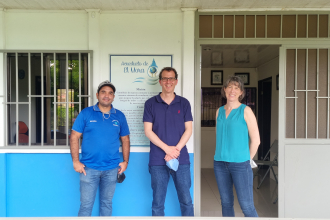Access to toilets and violence against women
This paper examines if in-home access to toilets reduces the risk of violent crimes against women. We use the roll out of the Swachh Bharat Mission, a flagship toilet construction program in India, to ascertain if assaults and rapes of women reduce when access to in-home toilets increases.

“Building long-term relationships with policymakers is the biggest challenge”
Twenty researchers from the Global South who obtained their doctor’s degree five years ago or less are participating in the EfD’s Early Career Fellowship program. The purpose of the program is to…

SETI 2022 Anual Workshop - Virtual Sessions
Dear All: We are pleased to announce that the virtual sessions of the Seventh Annual Workshop of the Sustainable Energy Transitions Initiative (SETI) will take place on June 23-24, 2022 (09:00 am - 12…

Strengthening networking and research collaboration on the water topic
Tanya Hayes and Felipe Murtinho, researchers from Seattle University, visited EfD Central America to identify opportunities for developing high-quality research proposals related to the Sustainable…
Role of Social Health Insurance in Achieving Universal Health Coverage
Background: Sustainable financing is the key to achieving universal health coverage (UHC). Kenya is keen on attaining the UHC by expanding the National Hospital Insurance Fund (NHIF). Methods: We extracted findings from the National Health Accounts (NHA) for Financial Years 2016/17 to 2018/19, the 2018 Kenya Household Health Expenditure and Utilization Survey, and evidence from other health sector documents that assessed health sector performance. Publications reporting access to health services were included to consolidate the findings.
Call for Paper: ERE Special Issue in Ecosystem and Human Health
Submission: Deadline: October 15th, 2022 Submission instructions: https://www.springer.com/journal/10640/updates/20241632 The call for this Special Issue solicits empirical or theoretical economic…
The effect of air pollution on migration: evidence from China
This paper looks at the effects of air pollution on migration in China using changes in the average strength of thermal inversions over five-year periods as a source of exogenous variation for medium-run air pollution levels. Our findings suggest that air pollution is responsible for large changes in inflows and outflows of migration in China. Specifically, we find that a 10 percent increase in air pollution, holding everything else constant, is capable of reducing population through net outmigration by about 2.8 percent in a given county.
Pagination
- Previous page
- Page 16
- Next page

